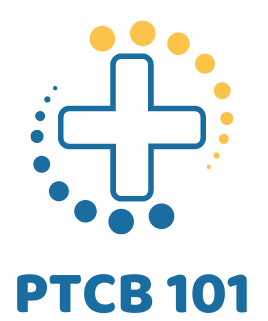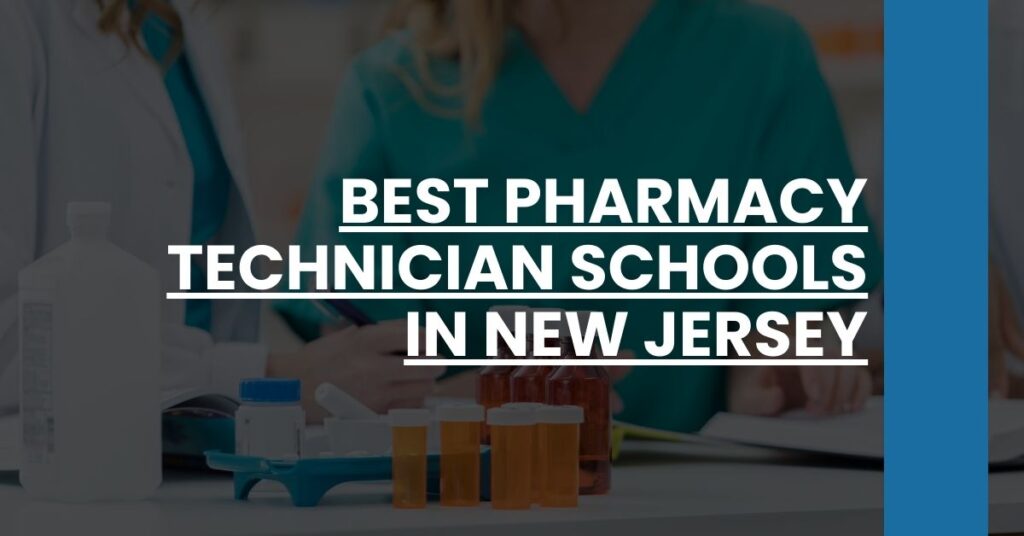Looking for programs in a specific city? Check out our lists of Pharmacy Technician Schools in Newark, Jersey City, Paterson, Elizabeth, Lakewood, Edison, and Woodbridge.
Choosing the right school is key to starting a successful career, and knowing the best pharmacy technician schools in New Jersey matters.
Deciding to become a pharmacy technician is a great move given the high demand for healthcare services here. Like many, you may find the path forward confusing with so many options available.
I’ve put together a guide to help you navigate this important decision. You’ll find:
- A list of the best pharmacy technician schools in New Jersey
- Tips on what to look for in a pharmacy technician school
- Information on program lengths, costs, and financial aid options
- Why Choose a Pharmacy Technician Career in New Jersey?
- What to Look for in a Pharmacy Technician School
- Top Accredited Pharmacy Technician Schools in New Jersey
- Cost and Financial Aid Options
- Program Length and Curriculum
- How to Apply and Admission Requirements
- Career Opportunities and Job Placement
- Continuing Education and Certification
- Looking for Pharmacy Technician School Information On States Bordering New Jersey?
- Conclusion
Why Choose a Pharmacy Technician Career in New Jersey?
New Jersey offers a range of benefits and opportunities for those considering a pharmacy technician career. The state’s demand for healthcare services is high, driven by its large population and aging demographics, making it an attractive option for aspiring pharmacy technicians.
Job Demand and Industry Growth
Strong Job Outlook: The Bureau of Labor Statistics projects a 4% growth in pharmacy technician employment from 2019 to 2029. This translates to approximately 15,700 new jobs nationwide. In New Jersey, the demand is notably higher due to the dense population and increasing need for healthcare services.
Competitive Salaries: Pharmacy technicians in New Jersey earn an average annual wage of around $35,000. With experience and certification, you could command even higher wages, offering both job security and financial stability.
Benefits of Working in New Jersey
Diverse Work Settings: New Jersey offers various work environments, from hospitals and retail pharmacies to long-term care facilities and mail-order pharmacies. These diverse settings ensure you can find a job that suits your preferences and professional goals.
Cultural and Economic Advantages: Living in New Jersey provides access to vibrant cultural scenes, high-quality education systems, and proximity to major cities like New York and Philadelphia. These benefits enhance your lifestyle and professional network.
What to Look for in a Pharmacy Technician School
Choosing the right pharmacy technician school is crucial for your career. Here’s what to consider to ensure a program aligns with your professional goals.
Accreditation
Recognized Accreditation: Ensure the school is accredited by reputable bodies like the American Society of Health-System Pharmacists (ASHP). Accreditation guarantees that the program meets industry standards and provides quality education.
Curriculum
Comprehensive Curriculum: Look for programs that cover essential topics including:
- Pharmacology
- Pharmacy Law and Ethics
- Medical Terminology
- Drug Information and Patient Care
Hands-on Training: Programs that include laboratory work and internships provide practical experience, which is invaluable in the job market.
Graduate Success Rates
Job Placement Rates: Investigate the school’s job placement rates for graduates. High placement rates indicate a strong network with local employers and effective career services.
Certification Exam Pass Rates: Check the pass rates for certification exams like the PTCB exam. High pass rates suggest that the program adequately prepares students for certification.
Top Accredited Pharmacy Technician Schools in New Jersey
Here are some of the best pharmacy technician schools in New Jersey, each offering unique features and high-quality programs.
American Institute of Medical Sciences & Education (AIMS) – Piscataway
Program Overview: Established in 2004, AIMS offers a 7-month day program and a 9-month evening program. Both options include a 250-hour internship component, providing extensive hands-on experience.
Unique Features: The program integrates real-world training, ensuring graduates are prepared for immediate employment.
Pennco Tech – Blackwood
Program Overview: Pennco Tech offers a comprehensive certificate program that includes hands-on training and internship opportunities.
Unique Features: The curriculum is designed to prepare students for work under licensed pharmacists, making it ideal for those seeking practical, on-the-job training.
Altierus Career College – South Plainfield
Program Overview: This 8-month blended diploma program includes training with PioneerRx pharmacy software, preparing students for various pharmacy environments.
Unique Features: The program’s blended format, combining online learning with practical experience, offers flexibility for students with different schedules.
Cost and Financial Aid Options
Understanding the costs and exploring financial aid options are critical steps in choosing a pharmacy technician school.
Typical Costs
Program Costs: Tuition for pharmacy technician programs in New Jersey typically ranges from $2,000 to $15,000. The cost varies based on the school’s reputation, program length, and included materials.
Financial Aid Options
Federal Student Aid: Students can apply for federal grants and loans through the Free Application for Federal Student Aid (FAFSA). These options can significantly reduce the financial burden.
Scholarships and Grants: Various scholarships and grants are available for pharmacy technician students. Platforms like Fastweb and the New Jersey Commission on Higher Education offer numerous opportunities:
- Stepful Scholarships: Up to $2,500 in scholarships for eligible students enrolling in their online pharmacy technician program.
Military Spouse Aid: Military spouses in New Jersey might qualify for financial assistance through the MyCAA program, providing up to $2,000.
Choosing the best pharmacy technician school in New Jersey involves careful consideration of accreditation, curriculum, and financial aspects. By selecting a well-regarded program that aligns with your career goals and exploring financial aid options, you can set yourself on a path to a rewarding and stable career.
Program Length and Curriculum
The length and structure of a pharmacy technician program play a significant role in your education experience. Knowing what to expect can help you plan your educational journey effectively.
Typical Program Lengths
Pharmacy technician programs generally range from 6 months to 2 years in duration. The length of the program often depends on whether it’s a certificate, diploma, or associate degree program.
- Certificate and Diploma Programs: Typically completed in 6 to 12 months, these programs focus on core pharmacy technician skills and often include an internship for hands-on experience.
- Associate Degree Programs: These programs usually take 18 to 24 months to complete and provide a more in-depth education, including general education courses along with specialized pharmacy technician training.
Core Elements of the Curriculum
Understanding the components of the curriculum can help you ensure it aligns with your career goals. Key areas often covered include:
- Pharmacology: You will learn about different drug classifications, mechanisms of action, and therapeutic uses.
- Pharmacy Law and Ethics: This section covers the legal and ethical considerations involved in pharmacy practice.
- Medical Terminology: Familiarity with medical terminology is crucial for effectively communicating with healthcare professionals and understanding prescriptions.
- Drug Information and Patient Care: This area focuses on how to provide drug information to patients and healthcare providers.
Hands-on Training and Internships
Practical experience is essential in this field. Many programs include a clinical component where you gain real-world experience in a pharmacy setting.
- Internships: These typically range from 200 to 300 hours and allow you to gain hands-on experience under the supervision of a licensed pharmacist.
- Laboratory Work: Some programs also include laboratory classes where you can practice skills like compounding and prescription processing.
How to Apply and Admission Requirements
Applying to a pharmacy technician school is a straightforward process, but you need to meet the necessary requirements.
Admission Requirements
- High School Diploma or GED: Most programs require you to have a high school diploma or equivalent.
- Minimum Age Requirement: You need to be at least 18 years old to enroll in most programs.
- Background Check: A clean criminal record is often a prerequisite for both admission and future employment in this field.
Application Process
Each school may have a slightly different application process, but here are the general steps:
- Submit an Application: Fill out the school’s application form, which is usually available online.
- Provide Transcripts: Submit your high school or GED transcripts.
- Letters of Recommendation: Some programs require letters of recommendation from teachers or employers.
- Entrance Exam or Interview: You might need to pass an entrance exam or participate in an interview, depending on the program’s requirements.
Additional Considerations
- Application Fee: Some schools charge an application fee, which can range from $25 to $100.
- Financial Aid Forms: If you’re applying for financial aid, complete the necessary forms, such as the FAFSA.
Career Opportunities and Job Placement
Starting a career as a pharmacy technician can be rewarding and offers various job opportunities. Understanding the job market and what to expect can help you prepare for your new career.
Job Placement Rates
High job placement rates can be a good indicator of the program’s effectiveness. Many schools provide statistics on the job placement rates of their graduates.
- AIMS and Pennco Tech: These schools boast high placement rates, largely due to their extensive industry connections and career services.
Major Employers
New Jersey offers a diverse range of employers for pharmacy technicians:
- Retail Pharmacies: Chains like CVS and Walgreens are major employers and offer various positions, from customer-facing roles to medication preparation.
- Hospitals: Working in a hospital can offer more specialized roles and typically involves collaboration with a broader healthcare team.
- Long-term Care Facilities: These settings often have unique requirements and offer different challenges and opportunities.
Job Titles and Roles
As a pharmacy technician, you could find yourself in various roles depending on your workplace:
- Data Entry Technicians: Responsible for inputting and verifying prescription information.
- IV Pharmacy Technicians: Specialize in preparing intravenous medications, often working in hospitals or specialty pharmacies.
- Inventory Management: Overseeing the supply and storage of medications and ensuring proper stock levels.
Continuing Education and Certification
Pursuing continuing education and obtaining certification can significantly boost your career prospects.
Importance of Certification
While certification isn’t mandatory in New Jersey, employers often prefer certified candidates. The most recognized certification is the Pharmacy Technician Certification Board (PTCB) certification.
- Enhanced Job Prospects: Certification can make you more competitive in the job market.
- Higher Earning Potential: Certified technicians often command higher salaries.
Continuing Education
Staying current with industry trends and advancements is crucial. Although not required, additional training can help you remain competitive.
- State Requirements: New Jersey doesn’t currently mandate continuing education for pharmacy technicians, but staying updated can provide a significant advantage.
- Professional Associations: Joining associations like the New Jersey Pharmacists Association or the New Jersey Society of Health-System Pharmacists can provide valuable resources and networking opportunities.
Looking for more Pharmacy Technician information? Check out our PTCB practice test, find pharmacy technician programs near you, learn how to become a pharmacy technician, explore options for online pharmacy technician programs, and see information about the pharmacy technician license.
Looking for Pharmacy Technician School Information On States Bordering New Jersey?
In addition to New Jersey, we suggest looking for schools in nearby states.
- Best Pharmacy Technician Schools In New York
- Best Pharmacy Technician Schools In Pennsylvania
- Best Pharmacy Technician Schools In Delaware
- Best Pharmacy Technician Schools In Maryland
- Best Pharmacy Technician Schools In Connecticut
Conclusion
New Jersey provides promising opportunities for aspiring pharmacy technicians. Selecting the right school involves considering accreditation, curriculum, financial aid options, and career support services. By choosing the best program that meets your needs, you can set yourself on a path to a rewarding career in this crucial healthcare field. For more details, you can also refer to How to Become a Pharmacy Technician in New Jersey.

